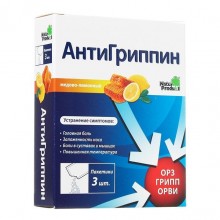



Drug for symptomatic treatment of acute respiratory diseases
infectious and inflammatory diseases (ARVI, influenza), accompanied by fever, chills, headache, pain in the joints and muscles, nasal congestion and sore throat and sinuses.
Paracetamol - 500 mg,
Ascorbic acid - 200 mg,
Chlorphenamine maleate - 10 mg.
Antigrippine is marketed under different brands and generic names, and comes in different dosage forms:
| Brand name | Manufacturer | Country | Dosage form |
|---|---|---|---|
| Antigrippine | Natur Product Pharma | Poland | sachet |
| Antigrippine | Natur Product Pharma | Poland | effervescent pills |
No customer reviews for the moment.
For oral use. Adults and children over 15 years old 1 bag 2-3 times a day. The contents of the bag should be completely dissolved in a glass (200 ml) of warm water (50-60 ° C) and immediately drink the resulting solution. It is better to take the drug between meals. The maximum daily dose is 3 sachets. The interval between doses of the drug should be at least 4 hours. In patients with impaired liver or kidney function and in elderly patients, the interval between doses of the drug should be at least 8 hours.
The duration of treatment without consulting a doctor is not more than 5 days when prescribed as an anesthetic and 3 days as an antipyretic.
The drug is well tolerated in the recommended doses.
In isolated cases, there are:
CNS: headache, feeling tired;
from the digestive tract: nausea, pain in the epigastric region;
on the part of the endocrine system: hypoglycemia (up to the development of coma);
on the part of the blood-forming organs: anemia, hemolytic anemia (especially for patients with a deficiency of glucose-6-phosphate dehydrogenase); extremely rarely - thrombocytopenia;
allergic reactions: skin rash, pruritus, urticaria, angioedema, anaphylactoid reactions (including anaphylactic shock), erythema multiforme exudative (including Stevens-Johnson syndrome), toxic epidermal necrolysis (Lyell's syndrome);
Other: hypervitaminosis C, metabolic disorders, sensation of heat, dry mouth, accommodation paresis, urinary retention, drowsiness. All side effects of the drug should be reported to the doctor.
Vitamin C
- increases the concentration of benzylpenicillin and tetracyclines in the blood;
- improves the absorption in the intestines of iron preparations (converts trivalent iron to bivalent); may increase the excretion of iron while using with deferoxamine;
- increases the risk of crystalluria in the treatment of short-acting salicylates and sulfonamides, slows the kidneys excretion of acids, increases the excretion of drugs having an alkaline reaction (including alkaloids), reduces the concentration of oral contraceptives in the blood.
- Increases the overall clearance of ethanol;
- with simultaneous use reduces the chronotropic effect of isoprenaline.
It can both increase and decrease the effect of anticoagulant drugs. Reduces the therapeutic effect of antipsychotic drugs (neuroleptics) - phenothiazine derivatives, tubular reabsorption of amphetamine and tricyclic antidepressants.
The simultaneous reception of barbiturates increases the excretion of ascorbic acid in the urine.
Chlorphenamine Maleate
Chlorphenamine maleate enhances the effect of hypnotic drugs.
Antidepressants, anti-parkinsonian drugs, antipsychotics (phenothiazine derivatives) increase the risk of side effects (urinary retention, dry mouth, constipation). Glucocorticosteroids - increase the risk of developing glaucoma. Ethanol enhances the sedative effect of chlorphenamine maleate.
Paracetamol
The interaction of paracetamol and inducers of microsomal oxidation in the liver (phenytoin, ethanol, barbiturates, rifampicin, phenylbutazone, tricyclic antidepressants) increases the production of hydroxylated active metabolites, which makes it possible for severe intoxications to develop with slight overdose.
While receiving paracetamol, ethanol contributes to the development of acute pancreatitis ..
Inhibitors of microsomal oxidation (including cimetidine) reduce the risk of hepatotoxic action.
The simultaneous intake of diflunisal and paracetamol increases the concentration in the blood plasma of the latter by 50%, increasing hepatotoxicity. The simultaneous reception of barbiturates reduces the effectiveness of paracetamol.
Paracetamol reduces the effectiveness of uricosuric drugs.